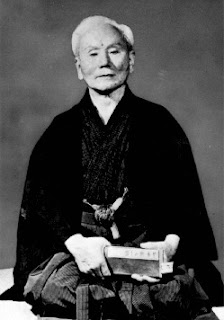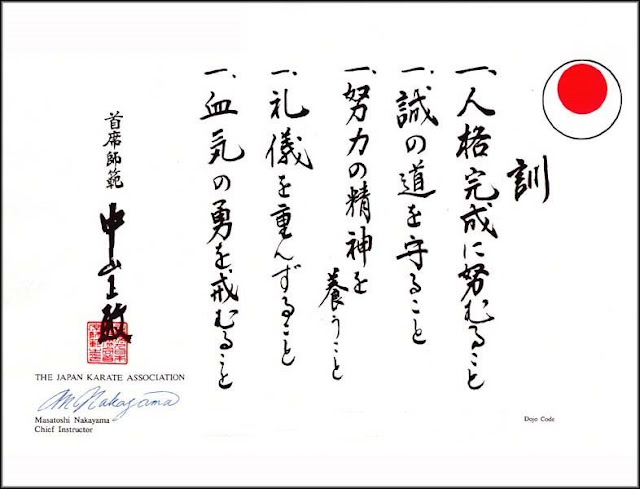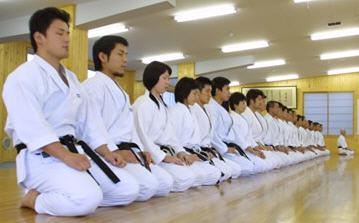Twenty
Precepts of Karate
Gichin Funakoshi laid out the Twenty Precepts of Karate,(or Niju kun) which form the foundations of the art, before some of his students established the JKA. Within these twenty principles, based heavily on Bushido and Zen, lies the Philosophy of Shotokan. The principles allude to notions of humility, respect, compassion, patience, and both an inward and outward calmness. It was Funakoshi's belief that through Karate practice and observation of these 20 principles, the Karateka would improve their Person.
1. Karate-do begins with courtesy and ends with rei.
2. There is no first strike in karate.
3. Karate is an aid to justice.
4. First know yourself before attempting to know others.
5. Spirit first, technique second.
6. Always be ready to release your mind.
7. Accidents arise from negligence.
8. Do not think that karate training is only in the dojo.
9. It will take your entire life to learn karate, there is no limit.
10. Put your everyday living into karate and you will find "Myo" (subtle secrets).
11. Karate is like boiling water, if you do not heat it constantly, it will cool.
12. Do not think that you have to win, think rather that you do not have to lose.
13. Victory depends on your ability to distinguish vulnerable points from invulnerable ones.
14. The outcome of the battle depends on how you handle weakness and strength.
15. Think of your opponent’s hands and feet as swords.
16. When you leave home, think that you have numerous opponents waiting for you.
17. Beginners must master low stance and posture, natural body positions are for the advanced.
18. Practicing a kata exactly is one thing, engaging in a real fight is another.
19. Do not forget to correctly apply: strength and weakness of power, stretching and contraction of the body, and slowness and speed of techniques.
20. Always think and devise ways to live the precepts of karate-do every day.
Dojo kun
Everyone
who trains in karate must know the dojo kun.
At the end of each training session whether it be at the dojo, after
class, or after a tournament, which I always call “Special Training” the dojo
kun is repeated all together by the students as a reminder of why we
train. The dojo kun states the basic
philosophy of karate, according to its founder , Master Gichin Funakoshi. Master Funakoshi believed that, for the true
karate-ka, the dojo kun should not only be considered a set of rules of conduct
in the dojo, but a guide to everyday life. Everything we learn in the dojo, we
should apply to everyday life.
Hitotsu: Jinkaku kansei ni tsutomuru koto
Seek perfection of character
This
is the ultimate goal of karate. The
other four principles of the dojo kun, as well as the entire nijyu kun, all
tell us what it means to seek perfection of character how we can go about
pursuing this highest objectives. But
this is the most important thing. We
seek perfection of character from the inside out. It is something we should do every moment of
every day of our lives.
This
means we should never stop learning.
Karate training, like life itself, is an ongoing process of growth and
personal education, a process that lasts for a lifetime. It is good to set goals, but as soon as we
accomplish them, it is important to set our sights on the next goal, to
improve. To seek perfection of character
is to always seek to improve oneself, to always endeavor to learn and
grow.
Hitotsu: Makoto no michi o mamoru koto
Be faithful
To
be faithful means to be sincere in everything you do. Here we are talking about making a total
effort, all the time, in whatever you do.
To
be faithful of course means that you have to be true to other people, to your
obligations but it also means you have to be true to yourself. And to do so means you have to do your best
in everything you do.
When
you are faithful to yourself, others will have faith in you. This creates mutual trust between
people. Being faithful to yourself is
essential to realizing the first goal of being the best person you can be.
Hitotsu: Doryoku no seishin o yashinau koto
Endeavor
Try
hard at everything you do. No matter
what you are doing, whether it’s training, working, having a relationship give
it one hundred percent. To do anything
else is to cheat yourself and others. If
you don’t endeavor to do your best, you are not being faithful to yourself and
others, and you are not trying to seek perfection of character.
Hitotsu: Reigi o omonzuru koto
Respect others
A
true martial artist always shows respect to other people. And it is something you ought to feel in your
heart. Showing respect is a sign of
humility, and humility is necessary for an open mind, which it turn is
necessary to learn, to grow. You can always
learn something from every person you meet.
Likewise, every person you encounter is a possible opponent of some
kind, and that opponent can pose a threat to you, physical or otherwise. In either case, if you respect everyone, you
will more clearly see things for what they are, and you will be able to get the
most of every experience.
Hitotsu: Keki no yu o imashimuru koto
Refrain from violent behavior
This
is a reminder to keep calm inside.
Control yourself at all times, from within. Conflict within is a form of violence. It leads to violent actions, which is
something you should try to avoid at all costs. A martial artist should always be in
control, and that begins with an inner calmness, with peace of mind. If you are forced to defend yourself as a
last resort, then it is all right to do so.
But you will only be successful defending yourself when you maintain a
calm, clear mind, in which case using karate technique to protect yourself will
truly be your reaction of last resort.






















